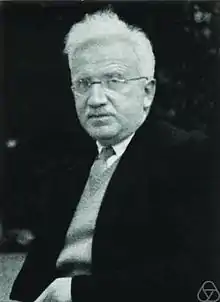Erich Hecke
Erich Hecke (20 September 1887 – 13 February 1947) was a German mathematician. He obtained his doctorate in Göttingen under the supervision of David Hilbert. Kurt Reidemeister and Heinrich Behnke were among his students.
Erich Hecke | |
|---|---|
 Photo courtesy of MFO | |
| Born | 20 September 1887 |
| Died | 13 February 1947 (aged 59) |
| Alma mater | University of Göttingen |
| Known for | Hecke algebra Hecke operator |
| Scientific career | |
| Fields | Mathematics |
| Doctoral advisor | David Hilbert |
| Notable students | Kurt Reidemeister Heinrich Behnke Hans Petersson |
Hecke was born in Buk, Posen, Germany (now Poznań, Poland), and died in Copenhagen, Denmark. His early work included establishing the functional equation for the Dedekind zeta function, with a proof based on theta functions. The method extended to the L-functions associated to a class of characters now known as Hecke characters or idele class characters; such L-functions are now known as Hecke L-functions. He devoted most of his research to the theory of modular forms, creating the general theory of cusp forms (holomorphic, for GL(2)), as it is now understood in the classical setting.
References
- Hecke, Erich (1937). "Neuere Fortschritte in der Theorie der elliptischen Modulfunktionen". In: Comptes rendus du Congrès international des mathématiciens: Oslo, 1936. vol. 1. pp. 140–156.
External links
- Erich Hecke at the Mathematics Genealogy Project
- O'Connor, John J.; Robertson, Edmund F., "Erich Hecke", MacTutor History of Mathematics archive, University of St Andrews.